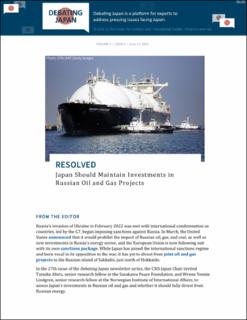Debating Japan - Opposition: Japan Should Maintain Investments in Oil and Gas Projects
| dc.contributor.author | Yennie Lindgren, Wrenn | |
| dc.date.accessioned | 2022-11-10T16:53:51Z | |
| dc.date.available | 2022-11-10T16:53:51Z | |
| dc.date.created | 2022-06-15T22:16:22Z | |
| dc.date.issued | 2022 | |
| dc.identifier.uri | https://hdl.handle.net/11250/3031277 | |
| dc.description.abstract | Russia’s invasion of Ukraine in February 2022 was met with international condemnation as countries, led by the G7, began imposing sanctions against Russia. In March, the United States announced that it would prohibit the import of Russian oil, gas, and coal, as well as new investments in Russia’s energy sector, and the European Union is now following suit with its own sanctions package. While Japan has joined the international sanctions regime and been vocal in its opposition to the war, it has yet to divest from joint oil and gas projects in the Russian island of Sakhalin, just north of Hokkaido. In the 27th issue of the Debating Japan newsletter series, the CSIS Japan Chair invited Taisuke Abiru, senior research fellow at the Sasakawa Peace Foundation, and Wrenn Yennie Lindgren, senior research fellow at the Norwegian Institute of International Affairs, to assess Japan’s investments in Russian oil and gas and whether it should fully divest from Russian energy. | |
| dc.language.iso | eng | |
| dc.relation.uri | https://www.csis.org/analysis/resolved-japan-should-maintain-investments-russian-oil-and-gas-projects | |
| dc.title | Debating Japan - Opposition: Japan Should Maintain Investments in Oil and Gas Projects | |
| dc.title.alternative | Debating Japan - Opposition: Japan Should Maintain Investments in Oil and Gas Projects | |
| dc.type | Journal article | |
| dc.description.version | publishedVersion | |
| dc.source.volume | 5 | |
| dc.source.journal | CSIS | |
| dc.source.issue | 2 | |
| dc.identifier.cristin | 2032251 | |
| cristin.ispublished | true | |
| cristin.fulltext | original |
Tilhørende fil(er)
Denne innførselen finnes i følgende samling(er)
-
Academic books and articles collection. Open access publishing by NUPI employees. [561]
Also including chronicles, papers, research reports, etc. from other publishers than NUPI. -
Publikasjoner fra Cristin - NUPI [1426]
